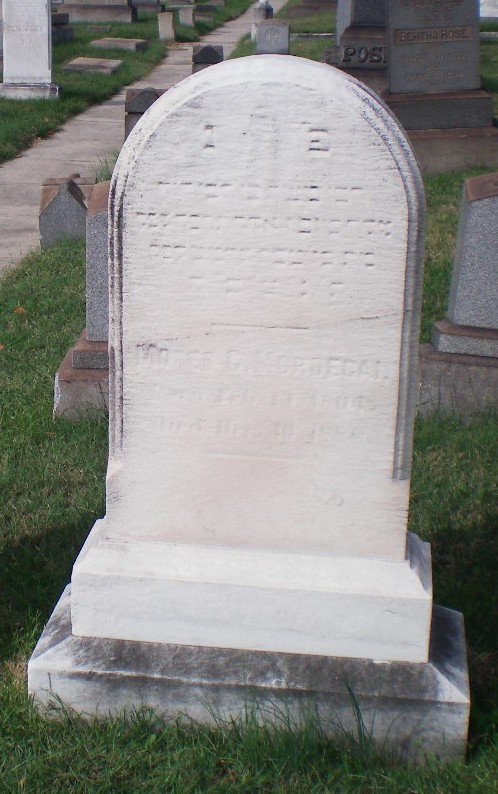He married Isabel Rebecca Lyons, daughter of Isaac and Rachel Cohen Lyons, on February 20, 1828. They became parents of eight children:
Isabel [1828-died young,
Hortensia [1830-1899],
Rosa Hays [Tobias] [1832-1897],
David Henry [1833-1859],
Isaac John Randolph [1835-1895],
Ellen Loria [Cohen] {1837-1915],
Minnie "Rachel" [Lazarus] [1839-1913] and
Isabel [1842-1927].
Moses Cohen was an importer of fruit, sugar, tobacco, and coffee and was Charleston's most prominent Jewish citizen in the decades before the Civil War. At various times, he was vice-president of the Charleston Ancient Artillery Society, a member of the board of health, captain of the Marion Artillery, a member of the committee on civic improvements, warden of police, commissioner of markets, a delegate to the Augusta Convention, a commissioner of pilotage, state representative, state senator, and director of the Southwestern Railroad Bank, the Gas Light Company, the South Carolina Insurance Company, and the Farmers' and Exchange Bank.
Moses Cohen and his wife lived in a mansion on Meeting Street near Saint Michael's Church. He was a close friend of Governor William Aiken. Aiken's predecessor, James Henry Hammond had derided Mordecai's brother, Isaac D,, a Columbia merchant, as "a miserable Jew." Yet even this notorious anti-Semite recognized Moses Cohen as "a man of force and influence."
In the debate over installing an organ in Beth Elohim's new building, he sided with the reformers in favor of the innovation. Upon the death of Joshua Lazarus in 1861, Moses became president of the congregation.
It was his steamer, "The Isabel", which transferred U.S. Army Major Robert Anderson and his men from Fort Sumter to the Union fleet following the opening bombardment of the Civil War. "The Isabel", named for his wife, gained fame for breaking through the Yankee blockade of the coast.
In February 1865, after Sherman's troops left Columbia smoldering behind them, the city council appointed Moses Cohen "food administrator" to help feed the starving citizens.
Blind and broken by the war, the reluctant secessionist moved to Baltimore, leaving his son-in-law Edgar Marx Lazarus in charge of his business affairs in South Carolina.
Although he lived the remainder of his years in Maryland, Moses Cohen nevertheless remained a benefactor to his native state. In 1870, he arranged for his company to bring home the bodies of eighty-four South Carolinians killed at the Battle of Gettysburg, at no cost to their families. They were reinterred in Charleston's Magnolia Cemetery under tombstones he purchased.
Blind for the last eighteen years of his life, Moses Cohen died in Baltimore on December 30, 1888. His wife, Isabel, lived until 1895.
He married Isabel Rebecca Lyons, daughter of Isaac and Rachel Cohen Lyons, on February 20, 1828. They became parents of eight children:
Isabel [1828-died young,
Hortensia [1830-1899],
Rosa Hays [Tobias] [1832-1897],
David Henry [1833-1859],
Isaac John Randolph [1835-1895],
Ellen Loria [Cohen] {1837-1915],
Minnie "Rachel" [Lazarus] [1839-1913] and
Isabel [1842-1927].
Moses Cohen was an importer of fruit, sugar, tobacco, and coffee and was Charleston's most prominent Jewish citizen in the decades before the Civil War. At various times, he was vice-president of the Charleston Ancient Artillery Society, a member of the board of health, captain of the Marion Artillery, a member of the committee on civic improvements, warden of police, commissioner of markets, a delegate to the Augusta Convention, a commissioner of pilotage, state representative, state senator, and director of the Southwestern Railroad Bank, the Gas Light Company, the South Carolina Insurance Company, and the Farmers' and Exchange Bank.
Moses Cohen and his wife lived in a mansion on Meeting Street near Saint Michael's Church. He was a close friend of Governor William Aiken. Aiken's predecessor, James Henry Hammond had derided Mordecai's brother, Isaac D,, a Columbia merchant, as "a miserable Jew." Yet even this notorious anti-Semite recognized Moses Cohen as "a man of force and influence."
In the debate over installing an organ in Beth Elohim's new building, he sided with the reformers in favor of the innovation. Upon the death of Joshua Lazarus in 1861, Moses became president of the congregation.
It was his steamer, "The Isabel", which transferred U.S. Army Major Robert Anderson and his men from Fort Sumter to the Union fleet following the opening bombardment of the Civil War. "The Isabel", named for his wife, gained fame for breaking through the Yankee blockade of the coast.
In February 1865, after Sherman's troops left Columbia smoldering behind them, the city council appointed Moses Cohen "food administrator" to help feed the starving citizens.
Blind and broken by the war, the reluctant secessionist moved to Baltimore, leaving his son-in-law Edgar Marx Lazarus in charge of his business affairs in South Carolina.
Although he lived the remainder of his years in Maryland, Moses Cohen nevertheless remained a benefactor to his native state. In 1870, he arranged for his company to bring home the bodies of eighty-four South Carolinians killed at the Battle of Gettysburg, at no cost to their families. They were reinterred in Charleston's Magnolia Cemetery under tombstones he purchased.
Blind for the last eighteen years of his life, Moses Cohen died in Baltimore on December 30, 1888. His wife, Isabel, lived until 1895.
Family Members
Advertisement
Explore more
Sponsored by Ancestry
Advertisement














